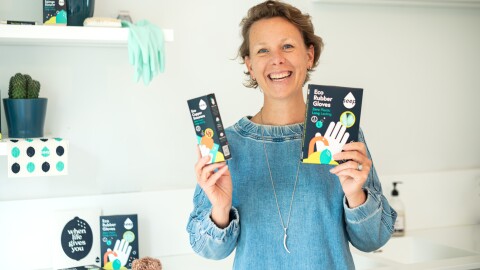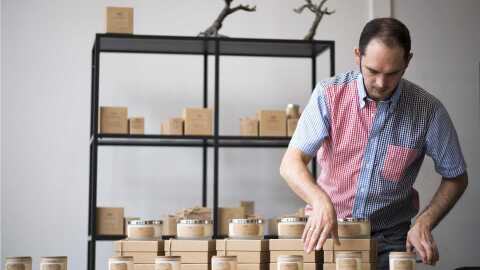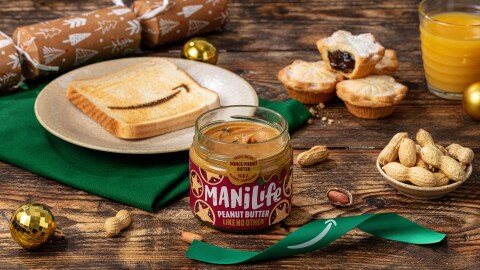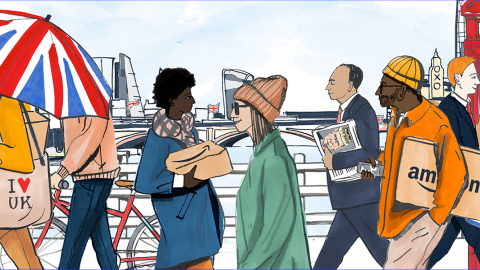For most people, a coconut palm evokes thoughts of tropical holidays. To a Sri Lankan farmer, it means work, dedication and a source of income. For Al Shariat, it represents his vision embracing sustainable business and ethical development, as well as the source of all the products that his company, The Coconut Merchant, distributes across the world.
More orders coming in meant more ways to have an impact on our farmers’ lives.
Making an impact on people’s lives
Al grew up in New Zealand, where he started his career as a lawyer: “It was 2008, and the financial crisis was at its peak. When people couldn’t pay their mortgage, it was my job to help big banks sell their homes. That wasn’t the reason why I had studied law. So, when I saw an opportunity to make a change by working at the United Nations, I jumped on it.”
Working as a consultant for the U.N., Al discovered a passion for microfunding, where farmers receive small loans which enable them to set up their own business. “If you live in a village in Southeast Asia you may trade with your community and maybe in some nearby villages, but you cannot really progress beyond that,” he explains. “However, if you pool people together, they can start producing at a larger scale and you can help them sell in major cities, or even internationally. I wanted to make that happen.”
Al kept thinking about his vision as he moved to London to complete his master’s degree. There he met Shan, a Sri Lankan entrepreneur: “Shan established The Coconut Merchant and had the right network to source high quality products in his home country, but he didn’t have the time to work on it. It was my chance to help him modernise the business while working closely with farmers.” In 2014, the two become business partners.
More than gatekeepers
“Working in a small business is all-consuming,” he recalls. “At the beginning I spent a lot of time just trying to get the office and products set up. Even now, I would be talking to my friends and my mind would wander off to thoughts on strategy, products and packaging. I am lucky they are very patient!”
Selling on Amazon was a key part of Al’s strategy. “Trading groceries is a competitive business and getting noticed by traditional retailers is not easy. Amazon is different as there is no gatekeeper that can stop you reaching the public,” he explains. He opens his shop on Amazon.co.uk in late 2014, initially focusing on becoming one of the top brands in the Groceries category.
It wasn’t always a smooth ride: to his great disappointment, the first order he received was cancelled on the very same day. “But then things started to pick up. We would include hand-written notes in our orders, and take good care of our returning customers,” he says. When, after a few months, Al’s brand made it to the top three in its category, he was delighted to see that major retailers like Selfridges and Holland & Barrett started listing his products, too. His strategy was working.
When orders could no longer be handled from the office in South London, Al switched to Amazon’s logistics service, Fulfilment by Amazon (FBA): “That was the turning point. Sales increased by 20%, which felt incredible: more orders coming in meant more ways to have an impact on our farmers’ lives.”
Sure enough, for Al the ethical aspect of business remains essential: “Our network allows us to skip middlemen, so we can get a fair price that directly benefits the farmers.” The coconut products are sourced from Sri Lanka, Thailand, Indonesia and the Philippines. Nearly all products are certified organic, and when it’s difficult for farmers to obtain a certification The Coconut Merchant helps them with the process.
Today, The Coconut Merchant employs a hardworking team, and its products are sold both online and in physical stores across Europe. The agenda for the next few months looks very busy: “We will launch into the U.S., something I am very excited about, and we will begin to test some non-coconut-based products, so we are definitely looking to grow further. Most importantly, we are looking to set up some development projects for our farmers’ communities. Currently we are sponsoring a high school and elephant orphanage, but I am keen to do more. It’s a dream come true.”
Al has some great advice for aspiring entrepreneurs: “No hesitations, just start. The most difficult part is finding the courage to roll the dice.”











